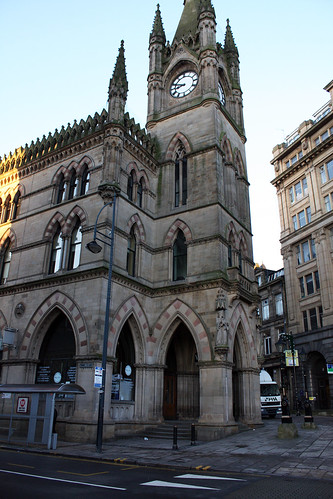 I read today that Bradford was voted the place that UK visitors would least like to visit. For those that have never heard of it, Bradford is a large city in West Yorkshire, in the north of England. It was once the centre of British wool manufacturing, and as this industry declined the fortunes of the city also waned. It is also the city with one of the highest Muslim populations in the UK. The ethnic diversity in Bradford has not led to widespread integration with the white and Asian populations living largely in well-defined separate areas. The city was the scene of serious race riots in 2001.
I read today that Bradford was voted the place that UK visitors would least like to visit. For those that have never heard of it, Bradford is a large city in West Yorkshire, in the north of England. It was once the centre of British wool manufacturing, and as this industry declined the fortunes of the city also waned. It is also the city with one of the highest Muslim populations in the UK. The ethnic diversity in Bradford has not led to widespread integration with the white and Asian populations living largely in well-defined separate areas. The city was the scene of serious race riots in 2001.
Bradford is also the place where I studied for my undergraduate degree, and the place where I met my wife. The city holds many very happy memories for me: cheap curries at 3am after a night out, visiting its many less than glamorous pubs and clubs with friends and having narrow escapes; the many foolish antics of a teenager away from home, and of course our first dates. I got to know the city well, and grew fond of it.
So when I read the story, it got me thinking. What is it that creates the strongest, most enduring memories of a place? Is it the beautiful monuments, the World Heritage listed architecture or the electric atmosphere? Or is it actually our own individual experiences of being there; the memories it triggers in our minds, the way we relate to the people we meet while we are there and even the fellow tourists we happen to befriend while staying in that place? Is that why I like Bradford when nobody else seems to care for it? And if that’s the case, how does this affect the tourist agencies’ efforts to attract visitors to their particular patch?
I think back to our trips to famous places. Of course the Taj Mahal was impressive, but my strongest memory of India is getting stranded in the snow in Manali and being evacuated on horseback. Not something that a tourist board could have dreamt up. Or of visiting Syria, where we were excited about seeing the Crusader fortresses and Roman ruins and yet the most abiding memory is the adventure we had when we got hopelessly lost while driving through the desert. The main attractions enticed us to visit, but it’s the unexpected events that linger most in the memory.
So I wonder about the approach that many marketing folks take in promoting the experiences on offer at a destination. Yesterday at the Best of Britain and Ireland show I saw many stands were promoting the intangible qualities of their destinations. Places with no obvious A list attractions were selling the experiences on offer: friendly locals, a good pint, a bracing walk.
But can these experiences really be bottled up and sold as a product to an incoming visitor? Surely they are entirely unique and dependent on the mood, personality and behaviour of the tourist and the people they happen to encounter during their visit.
And if that is the case and it really is the unexpected that creates the strongest memories, then maybe those moments are as likely to happen in Bradford as they are in other more glamorous cities. “Come to Bradford: something memorable will happen to you” – I don’t see it catching on, do you?






Interesting ruminations. Near misses, disasters, particularly rough accommodation and amusing occurrences do seem to dominate my travel memories (and the stories I share about my travels) but you are right, you are going to struggle to sell Cardiff on the basis that you might be sharing your hotel with a rowdy stag do!
However I think I dispute your claim argument about bottling up experiences to sell a place with no A list attractions. You could argue that people visit Laos for the chilled out backpacker vibe – and this is no different to visiting Ireland for the great pubs and live music or the Ribble Valley for the gastropubs and bracing walks.
Thanks Ben. I see your point re: Laos or Ireland and their charms. Even in Laos, despite all that I heard about its laid back ways before we went there, it wasn’t this that I remember most. It’s the individual moments: finding a UXO on a walk; wandering into a village school; and the hairy three hour ride on the back of a tuk-tuk bus. Maybe the things you mention help to sell a destination by appealing to us on one level; the stories we bring back are very different.